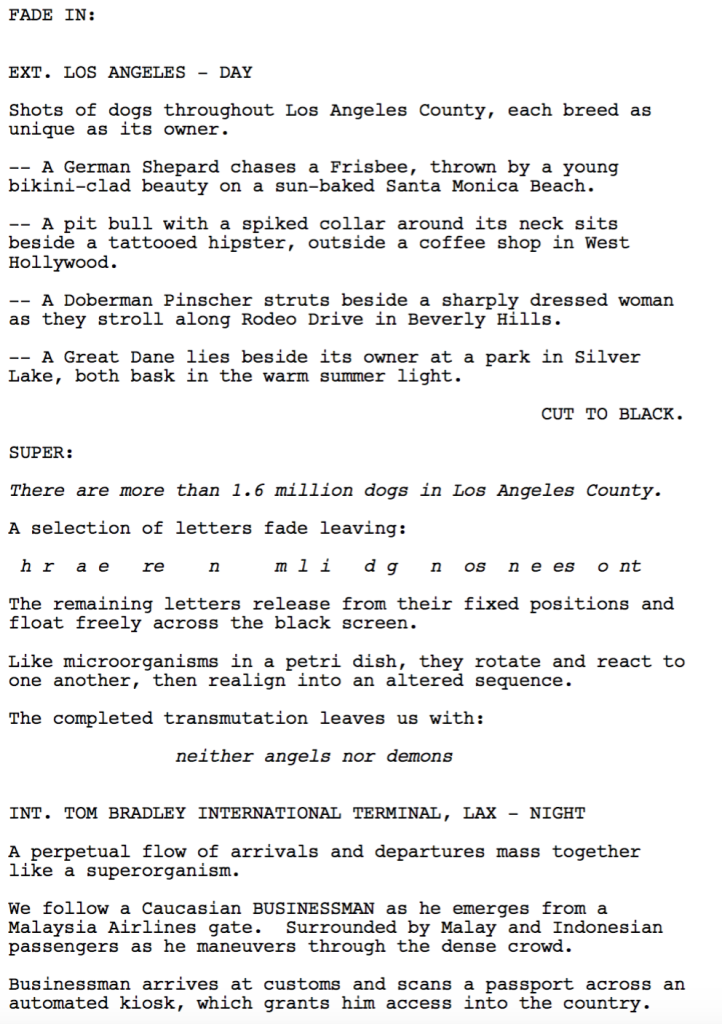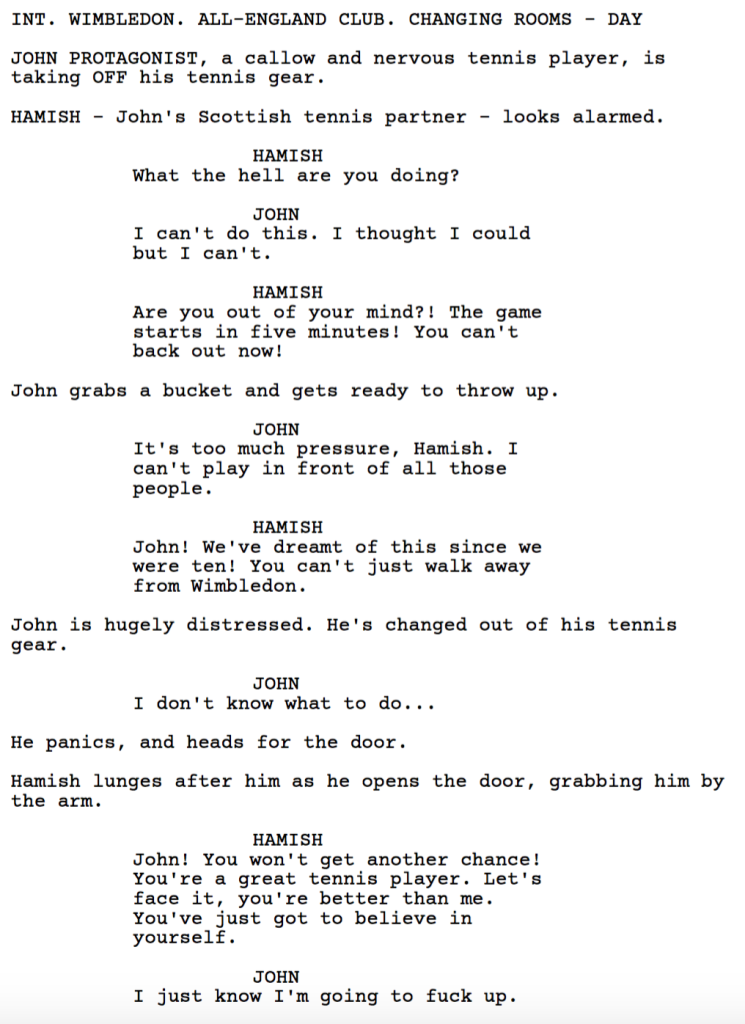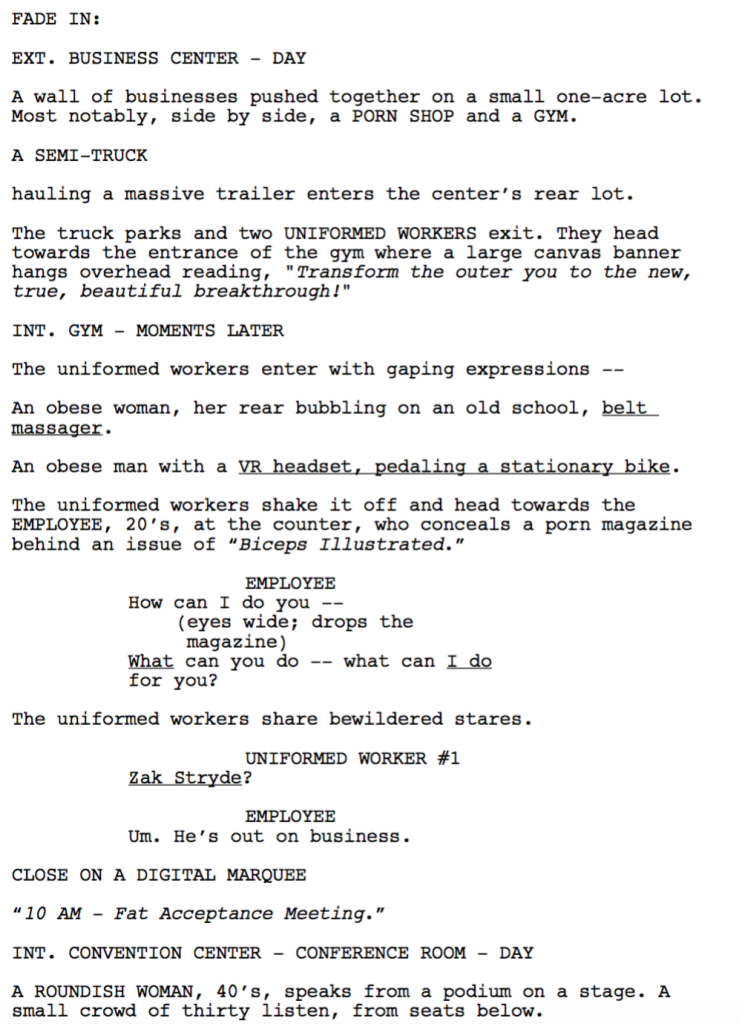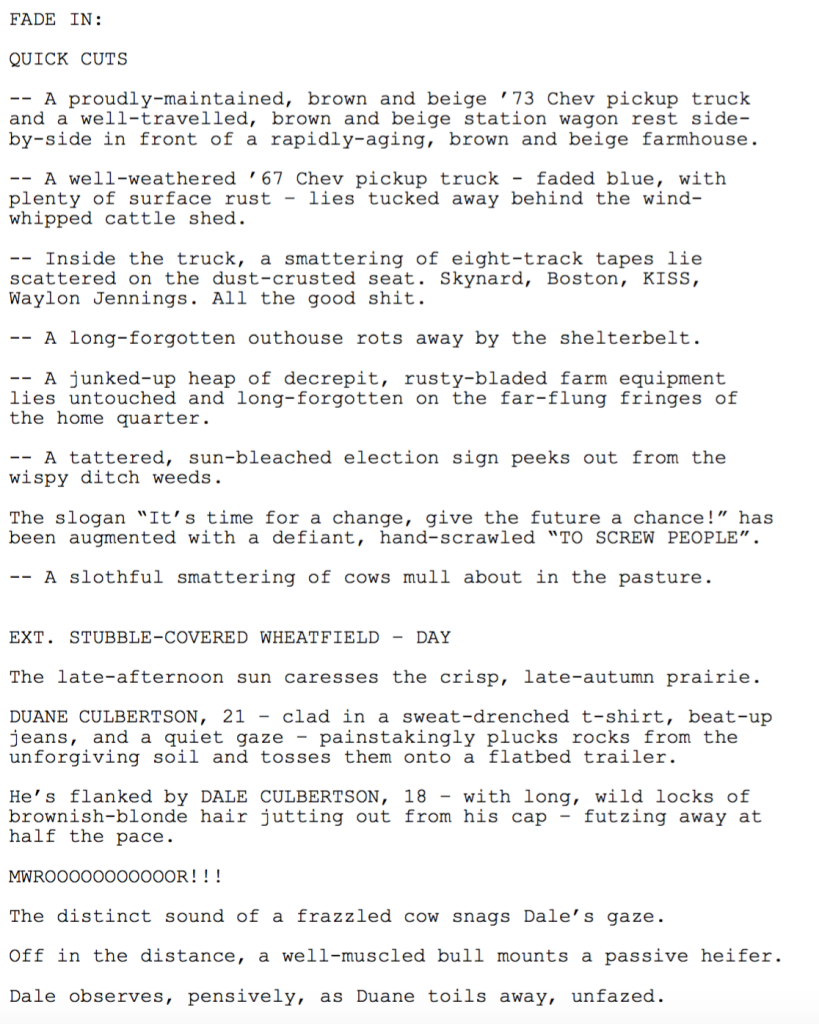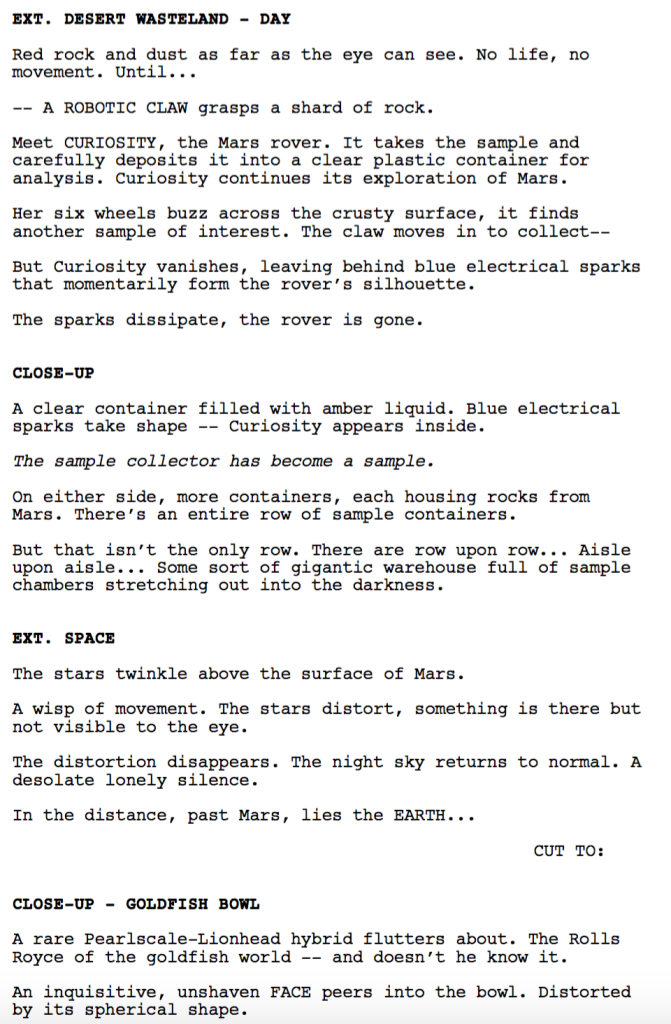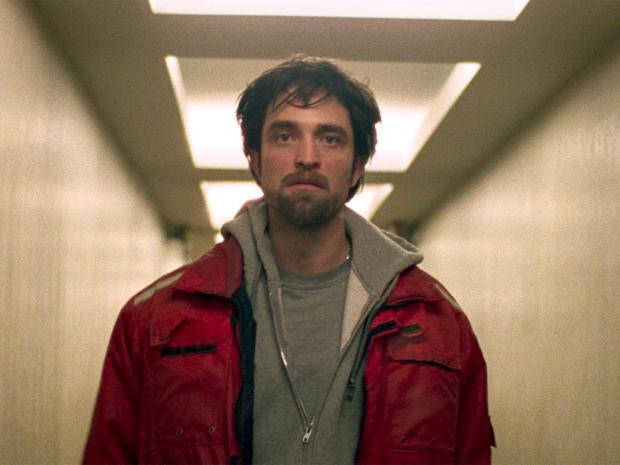Genre: True Story
Premise: When a lawyer is able to defeat Chevron in Ecuadorian court to the tune of 19 billion dollars, Chevron hires the most lethal and dirtiest lawyer money can buy to get the verdict thrown out.
About: This script made last year’s Black List. I believe both Jay Carson and Matt Bai are political correspondents and that this is their first foray into the screenwriting world. They obtained the rights to the 2012 New Yorker article “Reversal of Fortune” by Patrick Radden Keefe, in order to write the script.
Writers: Jay Carson & Matt Bai
Details: 131 pages
It’s important to remember that there was a time in Hollywood when Eddie Murphy was making movies in fat suits that had characters communicating in fart-speak.
I’m sure during those dark hours that every development exec in Hollywood feared the next spec script to land on their desk. Who knows what kind of fat/bodily-function combination they might have to read that day. A talking fat dragon that spoke vomit? A fat grandma who spoke in burps? An insanely obese brain surgeon who spoke in that flapping-your-hand-in-your-underarm noise?
And yet, those days eventually passed.
I have to remind myself of this when I look down at my pile of scripts and see: True story, true story, true story, true story, true story, true story, true story. Sooner or later, Hollywood audiences will get bored of the true-story biopic combo and we’ll be able to read stuff that has some actual, you know, IMAGINATION.
Until then, true stories make up 8 out of the 10 scripts out there. It’s so hard to get excited to review these things cause they’re all the damn same. And that’s the writer’s fault. You guys should know that Hollywood is inundated with these things so if you’re going to write your own true story, it better damn well be different than all the others.
Let’s find out if Donziger is different from all the others.
Steven Donziger has just done the impossible. The 50-something legal ace went down to Ecuador and won the country a 19 billion dollar settlement against Chevron, after the oil giant spent the last 30 years turning the country into a chemical dump.
Donziger heads back home with plans to celebrate. But what he doesn’t know is that David O’Reilly, the CEO of Chevron, has zero plans to pay this dude. He goes out and hires Randy Mastro, a sick-ass laywer with a lethal history of doing whatever it takes to get the job done. O’Reilly wants Mastro to reverse the whole damn judgement.
Mastro shows why he’s nasty right off the bat. Whereas every other Chevron lawyer wants to exploit the impossible-to-prove technicalities of the case (was Chevron ever “really” in Ecuador?), Mastro wants to go after the man himself. If he can convince a judge that Donziger pulled off some bad things during the trial, he could get that verdict reversed.
Mastro keys in on a documentary that Donziger was shooting during the trial and is able to get his hands on all the footage, essentially giving him a behind-the-scenes look at every single thing Donziger did during the trial.
Mastro notices that a mysterious man keeps popping up – a dude named Carlos Bernstain – who may have been a liaison to Donziger pulling some back-door bribes with the Ecuadorian judge. Mastro uses that tidbit to get a judge to enact a Gestapo-esque raid of Donziger’s home, where every one of his family’s computers is taken.
Meanwhile, Donziger refuses to give in. He uses some legal tricks of his own, convincing every country in the world who works with Chevron that, if it meant taking their cash, Chevron would not respect their laws. This causes Chevron stock to plunge and the race for that 19 billion is on. But can Donziger keep it up? Can anyone really defeat a 200 billion dollar company? My man Donny Z’s about to find out.
Make no mistake. This is a documentary. I mean, it’s an article. But it’s really a documentary.
And only certain documentaries can be turned into movies. This is not one of those documentaries. There’s too much legal mumbo-jumbo. There’s too much backstory. The story plays out over too long of a time. These are huge red flags when you’re thinking about adapting an idea into a feature.
I’ll give you an example. We learn the lawsuit is only half against Chevron. The other half is against Texaco, who was the original company that destroyed Ecuador. Chevron only came in later, buying up Texaco, and is being sued for not cleaning up Texaco’s mess. There are a ton of boring details like this that the script is forced to cover.
Since documentaries are, basically, one continuous stream of exposition, nuanced details like the above work great in them. But in feature films, exposition is the enemy. In an ideal script, exposition would be less than 5%. Here, it’s like 30-40% And it’s hard for a movie to gain any momentum when the exposition takes up that amount of time.
Truth be told, exposition is one of the things I hate most about these stories. So much needs to be conveyed before we can start dramatizing the story (that’s a fancy way of saying: before the story can actually be entertaining). And, indeed, I was half-asleep during the first 40 pages of this. It was maddeningly boring.
The script doesn’t pick up until Mastro arrives. It’s strange because the script is titled, “Donziger,” but it should really be titled “Mastro.” He’s the only interesting thing about this. His nasty tactics to reverse this settlement were the only fun the script had. You always wanted to see how nasty he was going to get next.
Also, I’m a big fan of holier than though villains, guys who do terrible things but market it like they’re angels doing the world a favor. I loved how Mastro was destroying a man who was trying to help a country recover from being turned into a cancer-breeding chemical dump, yet he could go on about how his actions were not only moral, but essential to keeping the sanctity of law in tact. At one point he makes an argument that what Donziger did was actually worse than what Chevron did (for those keeping count, Chevron killed thousands of people in Ecuador and left many more with cancer).
Unfortunately, Donziger the character doesn’t become interesting until the last third of the screenplay, when his secrets start to be exposed, and he begins to lose his family due to putting the case before them. I found all of that to be quite good, but giving me a vanilla character for 90 pages and turning him chocolate for the last 40 isn’t going to cut it.
Ultimately, Donziger the script has some good stuff going for it. It explores the moral ground between good and bad and reminds us that gray will always be where the majority of us reside. But I have to give the script a “wasn’t for me.” It’s probably closer to “worth the read” but there are so many scripts in this genre right now that if you can’t give me a true story that stands out in some way, it’s hard to endorse it, well-written or not. One of your jobs as a screenwriter is to be original. Unfortunately, Donziger fails that test badly.
[ ] What the hell did I just read?
[x] wasn’t for me
[ ] worth the read
[ ] impressive
[ ] genius
What I learned: I always love when characters make a point via a good analogy. It’s just a fun way to convey what would otherwise be boring dialogue. So in one of Mastro’s first scenes, he needs to convince O’Reilly to do things his way. This is what he says…
MASTRO: You know why the Yankees win so much?
O’REILLY: Money. Everyone knows that.
MASTRO: It’s what they do with the money. They buy left handed hitting and left handed pitchers. Why?
O’REILLY: Well, that stadium—
MASTRO: Has a short porch in right field. Exactly. They build their team around that field. Always have. Babe Ruth. Reggie Jackson. Whitey Ford.
O’REILLY: OK
MASTRO: When you go into Yankee Stadium, the game is rigged. You think you’re playing the same game as the Yankees, but you’re not. It’s their field and they always have the advantage.
O’REILLY: So you need some lefties of your own, right?
MASTRO: (shaking his head) It’s impractical. You’ll never build as good a team for that ballpark as they have. You want to beat the Yankees, your best shot is to get them in another venue… say Fenway where right field goes on forever.
O’Reilly nods — he gets it.
I will only say this. There is no way Das Chimp is real. Someone’s trolling me. They have to be. Yet I have never laughed harder on a second page. It may have been a meta-laugh. I’m still not sure. But if it isn’t, Das Chimp may end up being the best script ever written (of course, I wouldn’t know. I haven’t read past page 2. I’ll leave that up to you guys).
How to play: Read as much of each script as you can and submit your winning vote in the comments section. Winner gets a script review next Friday!
If you’d like to submit your own script to compete on Amateur Offerings, send a PDF of your script to carsonreeves3@gmail.com with the title, genre, logline, and why you think your script should get a shot. Good luck!
Title: Neither Angels Nor Demons
Genre: Action/Horror/Sci-Fi
Logline: After a rabies epidemic ravages Los Angeles, an estranged father and his fifteen-year-old daughter attempt to escape from the evacuated city.
Why You Should Read: This site encourages new writers to start small and develop their craft. Well, I started big. I wrote a script that would require hundreds of CG shots and a multimillion-dollar budget to produce. — It was a risk in a business that relies on a movie’s opening weekend, but my selling point to producers is this: The size of the target audience. Also, I feel like the summer blockbuster is an underrepresented script here on AF. Within my story I focused on unique characters, inspired action and moments of raw emotion. All based on an original concept. I hope you enjoy the result.
Title: Das Chimp
Genre: Monkey Tennis
Logline: After a tragic tennis accident, a failed tennis pro seeks redemption by coaching a talented chimp and entering him in to Wimbledon disguised in a man-suit.
Why You Should Read: This is the greatest monkey tennis story ever told. It’s an ironic homage, a pastiche if you will – a spoof if you must – of the great animal-based comedies of the 90s like Beethoven, Flipper, and Dunston Checks In, each one of them an iconic work which has stood the test of time.
Title: Eat, Gain, Lose
Genre: Comedy
Logline: After losing his gym and sinking into crippling debt, a fitness trainer packs on the pounds in a scheme to win the cash jackpot of a weight loss reality show.
Why You Should Read: Comedy has always been an elusive and challenging genre to write in. What strikes it hilarious to you might come off extremely idiotic or overly offensive to the person next to you. Additionally, the slow crash and burn of comedy at the box office has proved less to do with subjectivity of laughs and more to do with failing, floppy and emotionally vapid storytelling. If you’re like me and you’re tired of the countless comedies without substance but enjoy a solid story with comedy built around it, then I’d recommend you read my script.
Title: ACROSS THE LINE
Genre: Dark Dramedy
Logline: On a small-town Saturday night in 1979, beers are guzzled, tires (and other substances) are smoked, and mistakes are made, as redneck brothers Duane and Dale Culbertson set out to lay an ass-whoopin’ on the slimy son of a bitch that’s been messing around with Dale’s girlfriend.
Why You Should Read: I’m reaching out because too many good scripts tend to fall victim to the oversubscribed checklist mentality that shuns subtlety and smart storytelling for the sake of more explosions, purely external conflicts (of the ‘bad guys on your tail’ variety), and dumbed-down, oversimplified motivations. Everyone’s looking for ‘different,’ and no one’s looking for ‘better.’ There’s not enough scripts that take smart chances and break the rules. There’s not enough scripts that whisper confidently, instead of shouting. And there’s not enough people looking for these types of scripts. I’m also reaching out because I think it’s really cool that you gave extra profile to a script where an eighty-something-year-old Inuit woman gives a handjob to a teenager. You look past the checklist, and judge the script based on its ability to do what it was designed to do, whatever it may be.
Title: The Fishbowl
Genre: Sci-fi/Contained-thriller
Logline: After getting blackout drunk, a short-fused self-loathing plumber awakens aboard an unmanned alien research vessel and must escape its superior technology before it leaves our world forever.
Why You Should Read: Mankind has an unquenchable thirst to explore, and thanks to the wonders of modern science we have already sent a rover to Mars and a satellite to a distant comet. As technology continues to develop we will send unmanned exploration vessels deeper and deeper into the cosmos — But what would happen if we were on the receiving end? This idea got me thinking and lead to this rather fun and entertaining look as we follow a rather unlikely hero in an extreme ‘what if’ situation. I’d love to hear people’s thoughts on it.
A gay man trying to make it as an actor on Broadway is not a movie.
A gay man trying to make it as a boxer in Philly is.
A genius mathematician who wins the Nobel prize in Mathematics is not a movie.
A janitor at MIT who wins the Nobel Prize in Mathematics is.
A young free-spirited hippy girl experiencing a sexual awakening is not a movie.
A young uptight nun experiencing a sexual awakening is.
A millennial who becomes an overnight social media sensation is not a movie.
A baby boomer who becomes an overnight social media sensation is.
A superhero who handily fights crime 24/7 is not a movie.
A superhero who only gets his powers 1 hour a week is.
The true story of a talented doctor who became the most skilled surgeon of his generation is not a movie.
The true story of a surgeon who was diagnosed with Parkinson’s at the height of his career is.
A drop-dead gorgeous woman notorious for friend-zoning every guy she meets is not a movie.
A drop-dead gorgeous woman who gets friend-zoned for the first time in her life is.
A disgraced 5 star chef opening a big fancy restaurant in Paris is not a movie.
A disgraced 5 star chef opening a food truck in Brooklyn is.
A psychopathic Nazi who tried to kill more Jews than anyone else during World War 2 is not a movie.
A Nazi who secretly saved hundreds of Jews during World War 2 is.
Two life-long friends who go into the ice cream business together is not a movie.
Two enemies who open ice cream shops next to each other and battle for ice cream supremacy is.
Genre: Thriller
Premise: (from Black List) After a shooting at a police funeral by a suspected militia member, a recluse ex-cop and fellow militia man must interrogate the suspected gunmen in his own militia before copycat attacks start a nationwide war between cops and militia.
About: This script finished on the 2015 Black List. The film will star current Walking Dead villain, Jeffrey Dean Morgan. The writer, Henry Dunham, will also be directing. Dunham first made waves with his short, The Awareness, which you can watch here.
Writer: Henry Dunham
Details: 105 pages
Just want to give everybody a heads up. Yet ANOTHER female John Wick project is going into production, this one starring Alias vet, Jennifer Garner. The script is being written by Chad St. John, whose Scriptshadow interview you can check out here. Not going to mince words, guys. If you’ve got a female John Wick script, ya better finish fast. I sense that the end of this trend is coming, especially with the so-so box office of Atomic Blonde.
On to today’s script, which actually contains an ORIGINAL premise. Imagine that. A concept that isn’t following any trends but is rather blazing its own trail. I’ve always been fascinated by the militia. We basically allow people in our country to come together and form their own personal armies. How is that okay?? It was for that reason that I picked Militia up. Let’s find out if it rewarded my curiosity.
40 year-old Gannon lives out in the wilderness. He’s in the midst of smoking a deer for dinner when he hears automatic gunshots in the distance. These gunshots are followed by three explosions. Gannon immediately gets on the phone with a dude named Olsen and the two agree to meet at “The Safe House.”
That safe house is a reclusive lumber warehouse where Olsen and Gannon are soon accompanied by a trickling-in of militia members. There’s Beckman, the techy of the group, Morris, the giant Alpha Male with a chip on his shoulder, Hubbel, a slovenly mountain man, Keating, a deaf-mute, and Noah, the only guy here who looks reasonably presentable.
As the group listens in on the radio, they learn that someone has attacked a cop’s funeral and shot up a good 20 cops in the process. This is bad news because the first people they’re going to suspect in this shooting is the militia. And that’s where the meeting begins – how to make it clear they weren’t involved.
However, when they check their supplies and learn an automatic rifle and several grenades are missing, they realize they WERE the ones involved, and now it’s a matter of smoking out the guy who did it. Gannon takes the lead with the interrogations, convinced that the antagonistic Morris is their culprit.
But it quickly becomes clear that not everything is as at seems. And when word comes in that there have been TWO MORE major militia attacks in neighboring states, they realize that this is way bigger than just one guy. In the end, it’ll be up to Gannon to figure out who’s lying and who’s telling the truth before the police find them, raid the warehouse, and kill them all.
UGH!
I so wanted this to be great! I loved this setup.
So here’s a great tip for screenwriters looking for a big concept that can be made on the cheap. As we’ve discussed before, when your script is cheap to make, you increase the number of potential buyers exponentially.
To do this, start with a really big idea. It can be anything. A giant monster. A mega-quake. A nuclear war. Whatever. But don’t build the story around the actual subject. That’d be expensive. Build it around characters who are affected by the subject.
What this does is it makes your movie feel big even though it’s small.
That’s what Dunham does here. There’s a big attack on this cop funeral, but we don’t see a frame of it. We hear it. But we don’t see it. Then, the entire movie takes place in a warehouse with these characters trying to figure out which one of them perpetrated the attack.
Do you know how cheap it would be to make this movie? You could shoot it in 2 weeks. And it still FEELS BIG. That’s really smart writing there.
Another thing I liked about this script was that it was a SITUATION. What I mean by that is, we don’t see the attack, watch someone run away, show the cops prepare to catch them, show our attacker hide out, meet a love interest, try to move to the next safe area, get into a chase scene, etc., etc.
That’s not a situation. That’s a series of events.
Militia is a situation. A bunch of dudes in one place. One of them killed some cops. The leader has to figure out which one of them did it. Every person who walks into this theater is going to immediately understand what this movie is about. What the setup is. What the rules are. It’s a clear situation.
Not that non-situations can’t work. Yesterday’s film, Good Time, wasn’t a situation and it was a great flick. But situations tend to work really well for feature films. So if you can think of a good one, write it. Other situation-films include The Shallows, 10 Cloverfield Lane, Saw, The Hateful Eight, The Thing, The Wall, Birdman and The Martian.
Yet another great tip to take away from Militia is the mid-point RAISING OF THE STAKES. Remember that when you go into the second half of your story, you need to make things feel bigger somehow. If they stay the same, people are going to get bored. Especially in a movie like this, where you only have one location to work with.
So the midpoint news that it wasn’t just this one funeral attack that happened, but that there was a coordinated attack against cops across three separate states? That’s when I was like, ooooh, this is good. The movie was growing beyond its original setup. That’s always a good thing.
But all was not perfect with Militia.
My big issue with it was that the character-to-character interactions felt a little… phony. I didn’t get the sense that the writer really understood what militia men were like. And this is a common issue in screenwriting. You pick an idea because you like it, but you don’t know anything about the actual subject matter.
So you have a choice. You can do some research and combine it with what you’ve learned through similar movies that you’ve seen, or you can really do the hard work. That means doing a fuck-ton of research. That means finding and locating an actual militia member and talking to them. Learning what their day-to-day life is like.
Nobody likes to do this. So the more common route is the former. And, unfortunately, when you do the former, there’s a lack of authenticity to the proceedings. And I’m not saying it was insufferable here. Some of the interactions felt real. But there were enough moments where I wondered, “Would this really be happening this way?” that it affected my enjoyment of the story.
With that said, I love this setup and I have a feeling that with some rewrites, these authenticity problems can be fixed. So I’m going to recommend Militia. It’s a fun script.
[ ] What the hell did I just read?
[ ] wasn’t for me
[x] worth the read
[ ] impressive
[ ] genius
What I learned: If you really want to make your descriptions pop, use analogies. When you have a guy with a deep voice, you don’t want to say, “His voice is deep and throaty.” That’s boring. Do what Dunham does. Here, he describes mountain man Hubbel’s voice with an analogy: “Every word from Hubbel sounds like gravel being raked.”
I thought I was walking into a post-Twilight trainwreck. Instead I think I just saw the next Trainspotting.
Genre: Thriller
Premise: When his brother is thrown in jail after a bank robbery gone bad, a low-life street thug will do anything to bail him out by the end of the night.
About: Good Time is the second feature from the Safdie Brothers (Ben and Josh), who call Good Time their “first real movie.” Robert Pattinson, who stars in the film, reached out to the brothers after seeing a still image from their first project and basically begged them to be in their next movie. The brothers reluctantly cast him, unsure if he could handle the role. The film premiered at the Cannes film festival, where it received a 6 minute standing ovation.
Writers: Ronald Bronstein, Josh Safdie
Details: 100 minutes
What if I told you that I saw the next Trainspotting?
Would you believe me?
Because I think I just did.
Last week, I was dragged to an early screening of Good Time. I say dragged because the only reason I went was because a friend of mine is a huge Robert Pattinson fan and Pattinson is in the movie. “A Robert Pattinson indie movie?” I said. “Seriously? That’s like, guaranteed bad.”
I know what you’re going to say. He was in Rover and Cosmoplis and Lost City of Z and blah blah blah. But does anybody actually remember those movies outside of festival going cinephiles who check movie websites 12 times a day?
Adding to the potential suckage factor was that I’d never heard of the directors before. That’s typically a bad sign. I was preparing for your average 2 hour experimental indie flick with no story and less direction, a student film on crack.
What I got instead was… well… something wonderful.
Good Time follows Connie (Pattinson), a low-life piece of shit who keeps his older girlfriend around specifically to squeeze money out of her whenever he needs to get out of trouble or score his next high. The only good thing Connie does is take care of his mentally challenged older brother, Nick.
At the beginning of the movie, Connie rips Nick out of a center for handicapped people, furious that these assholes keep trying to institutionalize him. Ironically, Connie then preps Nick to rob a bank with him (was he really worse off at that center)? Everything goes smoothly until the dye pack explodes on the money, resulting in a dash for freedom. But the cops end up catching Nick.
Connie then must find 10 grand to bail his brother out of jail, who will be helpless otherwise. He tries to get his girlfriend to pay up but her credit card is declined. In a stroke of good luck, Nick is beaten up in jail, and transferred to the local hospital. Connie then breaks into the hospital and rescues him.
I won’t tell you what happens next but I will say that everything goes to shit and that the first half of the movie, which was relentlessly paced, is nothing compared to the second half, where things truly get fucked up. Connie will go to the limit to save his brother, and that means nobody will get in his way.
Here’s the thing that surprised me most about this screenplay: URGENCY.
Every damn indie film I watch is devoid of urgency. They’re all wrapped in “Feelings” and “Serious” molasses, strolling down slow-as-shit lane, trying to make points about the world or the human condition or whatever. And then something like Good Time comes along and shows you that you can do all that but STILL ENTERTAIN AUDIENCES.
I think that’s why Trainspotting stood out so much when it debuted. When you write something with this kind of urgency, it’s impossible not to take notice. These movies will always stand out.
But it wasn’t just the pace that impressed me. Let’s look at one of the classic screenwriting dilemmas, which Good Time faces in spades: A terribly unlikable main character.
I mean, this guy is just a bad dude on every level. There’s a scene early on where Connie shows up at his older girlfriend’s house (played awesomely by Jennifer Jason Leigh) and as soon as the girlfriend’s mom sees him she starts screaming for her to close the door. She knows what Connie means. Connie means, “I’m here to take more of your money.”
He wrestles his girlfriend away and, on the way to the police station, slowly and heartlessly manipulates her. It’s truly awful behavior.
So why do we still root for someone like Connie? Do you want to take a guess? C’mon. Those of you who have been reading this site should know. I’ll give you a minute to ruminate.
Because Connie loves his mentally challenged brother more than anything. If you want to make a bad protagonist likable, that’s all you have to do. No, you don’t have to write in a retarded family member. But place a family member in some sort of a weakened state (someone’s trying to take advantage of them), have your protagonist fight to the death for that character, and we’ll like him. We’ll root for him NO MATTER WHAT.
But the screenwriting good times didn’t stop there. Whenever you have a full-on super-paced thriller script, where you’re racing from start to finish, there will always be one section, near the midpoint, where you stop, rest, and recuperate. This section always lasts about 10-15 minutes.
I can tell if a writer knows what he’s doing by how he approaches this section. Because 9 times out of 10, this section will consist of one character telling another character some sad backstory, which is the most boring choice you can possibly make.
If you can somehow make this section unexpected and interesting, I know you’re a badass screenwriter. Because it’s hard to make the one slow section in your script stand out from the rest of it.
In Good Time, this section has Connie getting stuck in some Jamaican woman’s home (he’s hiding from the cops). Connie starts hanging out with this woman’s underage granddaughter. The two have this awkward energy and you just know things are going to get weird. I won’t go into detail about what happens. But we’ll just say that when they’re watching TV and Connie’s face comes up on the local news, Connie does something nontraditional to get the girl to overlook that a criminal is in her house.
And I haven’t even gotten into the score, which is freaking amazing. It’s this constant pulse-pounding beat accompanied by these blaring eighties synth-chords that often become the focus of the scene. I haven’t experienced a soundtrack that’s added this level of atmosphere to a movie since Blade Runner.
I’d say that film was a clear influence to the Safdie’s, along with Drive and Trainspotting.
After the film, there was a question and answer session with the directors and Pattinson. These things are always a little awkward, and this one was no exception. Pattinson told a story about how he reached out to the directors after seeing the poster for their first movie and told them he wanted to work with them. The brothers openly discussed (right in front of Pattinson) that they had no intention of e-mailing him back because he wasn’t a good enough actor for the kind of movie they wanted to make.
But they ended up taking a chance on him and it’s looking like a good one for everybody involved. This is easily Pattinson’s best performance and this is the kind of movie that whether you like it or hate it, you will never forget it. It’s a neon-infused nightmare thriller that introduces the world to two talented directors who will be around for a long time.
[ ] What the hell did I just watch?
[ ] wasn’t for me
[ ] worth the price of admission
[x] impressive
[ ] genius
What I learned: In a thriller, your midpoint will almost always consist of your characters resting and recuperating for 10-15 minutes. This section is needed to allow the audience to take a breath and get ready for the second half of the film. However, don’t slack in this section. Try to do something interesting with it. Throw a few unexpected choices in there. And definitely don’t have your protagonist tell some other character about a story from their past. EVERYBODY does that. Instead, tell us about your character THROUGH THEIR ACTIONS AND CHOICES RIGHT NOW, IN THIS SCENE.



